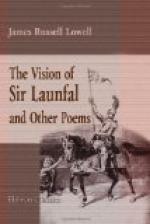By thoughts of thy brute lust,—the hive-like hum
Of peaceful commonwealths, where sunburnt Toil 160
Reaps for itself the rich earth made its own
By its own labor, lightened with glad hymns
To an omnipotence which thy mad bolts
Would cope with as a spark with the vast sea,—
Even the spirit of free love and peace, 165
Duty’s sure recompense through life and death,—
These are such harvests as all master-spirits
Reap, haply not on earth, but reap no less
Because the sheaves are bound by hands not theirs;
These are the bloodless daggers wherewithal 170
They stab fallen tyrants, this their high revenge:
For their best part of life on earth is when,
Long after death, prisoned and pent no more,
Their thoughts, their wild dreams even, have become
Part of the necessary air men breathe: 175
When, like the moon, herself behind a cloud,
They shed down light before us on life’s sea,
That cheers us to steer onward still in hope.
Earth with her twining memories ivies o’er
Their holy sepulchres; the chainless sea, 180
In tempest or wide calm, repeats their thoughts;
The lightning and the thunder, all free things,
Have legends of them for the ears of men.
All other glories are as falling stars,
But universal Nature watches theirs: 185
Such strength is won by love of human-kind.
Not that I feel
that hunger after fame,
Which souls of a half-greatness
are beset with;
But that the memory of noble
deeds
Cries shame upon the idle
and the vile, 190
And keeps the heart of Man
forever up
To the heroic level of old
time.
To be forgot at first is little
pain
To a heart conscious of such
high intent
As must be deathless on the
lips of men; 195
But, having been a name, to
sink and be
A something which the world
can do without,
Which, having been or not,
would never change
The lightest pulse of fate,—this
is indeed
A cup of bitterness the worst
to taste, 200
And this thy heart shall empty
to the dregs.
Endless despair shall be thy
Caucasus,
And memory thy vulture; thou
wilt find
Oblivion far lonelier than
this peak,—
Behold thy destiny! Thou
think’st it much 205
That I should brave thee,
miserable god!
But I have braved a mightier
than thou.
Even the tempting of this
soaring heart,
Which might have made me,
scarcely less than thou,
A god among my brethren weak




